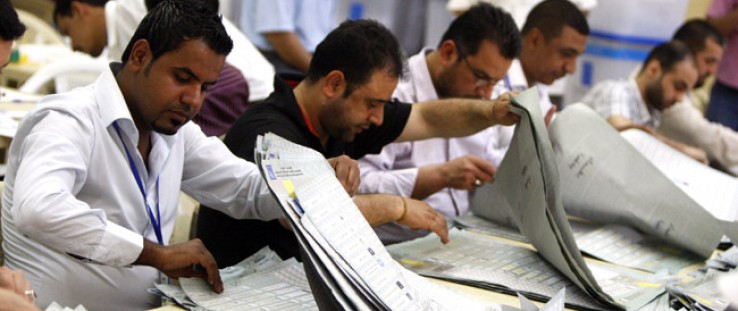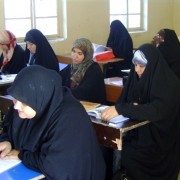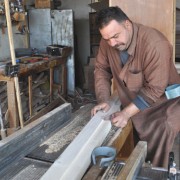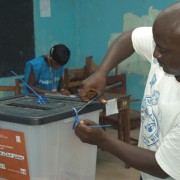 Iraqis count votes at the Independent High Electoral Commission headquarters in Baghdad on March 12, 2010, following Iraq's second general elections since the U.S.-led invasion of 2003.
Ahmad Al-Rubaye, AFP
Iraqis count votes at the Independent High Electoral Commission headquarters in Baghdad on March 12, 2010, following Iraq's second general elections since the U.S.-led invasion of 2003.
Ahmad Al-Rubaye, AFP
 Iraqis count votes at the Independent High Electoral Commission headquarters in Baghdad on March 12, 2010, following Iraq's second general elections since the U.S.-led invasion of 2003.
Ahmad Al-Rubaye, AFP
Iraqis count votes at the Independent High Electoral Commission headquarters in Baghdad on March 12, 2010, following Iraq's second general elections since the U.S.-led invasion of 2003.
Ahmad Al-Rubaye, AFP
On Sept. 1, 2010, the U.S. military officially ended combat operations in Iraq and shifted the leadership of U.S. engagement to civilians.
It was a milestone few could imagine during the worst days of the Iraq War, which began in 2003 with a quick routing by a military coalition led by the United States, and then an extended slog as the Iraqi insurgency and Al-Qaeda fighters mounted a counter-campaign with a lethal combination of traditional arms and improvised weapons.
Together, the United States and Iraq have faced many challenges to promote stability and development after the fall of the previous regime. Now the Iraqi-U.S. partnership that began seven years ago is at a critical crossroads. Just as USAID and the State Department are taking the lead in relations with the country, Iraqis are transitioning from a legacy of war and insurgency onto a course of economic opportunity and good governance they themselves are plotting.
USAID has played a key role in the civilian assistance effort since the beginning. Today that assistance includes helping Iraqis improve the effectiveness of their government and civil society, expand private-sector opportunities, increase agricultural production, manage natural resources effectively and efficiently, and promote just, democratic, and inclusive processes and institutions. In addition, USAID provides humanitarian assistance and support for internally displaced persons.
The U.S.-Iraq Strategic Framework Agreement, which USAID helped craft, is the bilateral assistance framework for relations between both countries.
“Development is never easy, and trying to do development work in a conflict zone is even more difficult,” said USAID/Iraq Mission Director Alex Dickie. “We are adopting creative solutions to address the challenges. We have been successful through the commitment of thousands of Iraqis who are helping to rebuild their country.” But increased local capacity has not only benefitted Iraqis. It is, in part, this concerted shift to Iraqi hands that has enabled the U. S. military to redirect resources to other areas of pressing need.
Seven Years, Three Stages
USAID’s program in Iraq has evolved through three distinct phases. From 2003 to 2005, assistance focused on restoring essential services such as infrastructure, health care, and education, as well as helping Iraqis develop a new constitution and a government that respected the rights of all its citizens. In January 2005, the Iraqi Government was able to hold its first free and fair elections with USAID support, marking an important step in Iraqi sovereignty. (See related story: Supporting Iraq’s New Parliament and Its Electoral Process.)
From 2006 to 2008, the Agency promoted stability in communities most affected by the increasing violence in the country by providing jobs, training, and small grants to at-risk youth who might otherwise be attracted to the insurgency. It was in 2006 that former President George W. Bush introduced the initiative that would become known as “the surge,” and when joint civilian-military Provincial Reconstruction Teams, or PRTs, were deployed throughout the country to improve U.S. engagement with Iraqis.
During this time period, USAID continued governance and community action programs at the local and provincial levels. The Agency’s flagship governance program, dubbed Tatweer, was designed to increase the effectiveness of ministries by reforming internal operational systems, teaching best practices to civil servants, and instituting international standards to provide expert advice at key ministries. (See related story:Building the Skills Iraqis Need for the Services They Want.)
USAID also supported private-sector development through microfinance lending, community outreach, and centers that supported small-business development.
Consolidation of Gains
Beginning in 2009, USAID began consolidating the gains it achieved since the surge. USAID continues to support private-sector development and improving the Iraqi Government’s ability to deliver essential services to its people.
In April 2010, the Iraqi Government released the National Development Plan, which calls for comprehensive social, economic, and environmental development with the goal of generating 9.8 percent annual gross domestic product growth, 3.5 million new jobs, and reducing poverty by 30 percent (compared to 2007 levels) over the next five years. USAID helped the Iraqi Ministry of Planning formulate the plan, an important milestone that outlines the Iraqis’ own priorities and vision of how to achieve them.
Other new initiatives are targeting the justice, financial, and legislative sectors.
The Iraq Access to Justice Program is working to ensure that vulnerable people, including religious minorities, are aware of their legal rights; that they have links to legal professionals and citizen advocacy organizations; and that Iraq’s legal framework recognizes, promotes, and ensures the rights of the disadvantaged.
In the financial arena, USAID is working to develop the private sector though focused reform, business education, and training. And the Legislative Strengthening Program currently plays a key role in strengthening Iraq’s new Council of Representatives, increasing parliamentarians’ capacity to oversee government operations, formulate legislation, and respond to their constituencies.
New Government, New Priorities
In December 2010, Iraq’s Parliament approved a new government that represents a broad cross-section of the country. Far from the days when just staying alive was a priority, employment, good governance, improved public services, and security are the most pressing issues in people’s lives today, they say.
While Iraqi Government institutions are taking the lead in service delivery, USAID is focusing on mentoring, analytical support, and other forms of technical assistance to increase Iraq’s capacity to manage its resources productively and sustainably.
“USAID’s operational knowledge, coupled with the significant and far-reaching results achieved by the entire U.S. Government’s efforts in Iraq, present a strong foundation to advance the shared goals of both countries,” Dickie said.












Comment
Make a general inquiry or suggest an improvement.